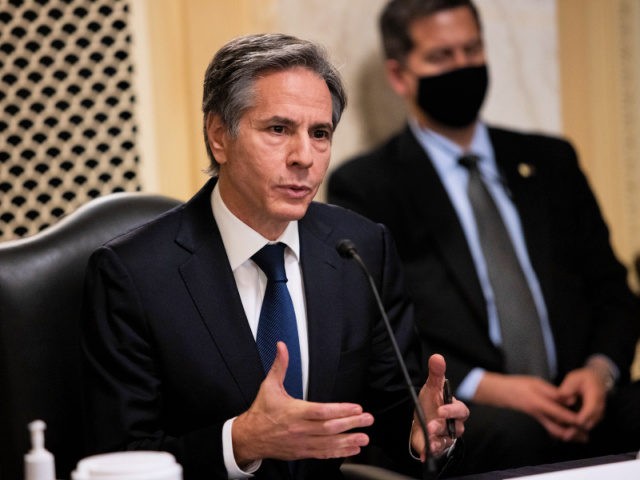U.S. Secretary of State Antony Blinken sent a letter to Afghan President Ashraf Ghani on Sunday urging him to take on a more “constructive” attitude in talks with the Taliban and warning President Joe Biden may still adhere to a May 1 deadline to fully withdraw American troops from the country.
After two decades of war, the U.S. government under President Donald Trump opened negotiations with the Taliban, the jihadist terrorist organization that governed Afghanistan before the American invasion, last year. The talks resulted in a “peace deal” in which the White House agreed to fully withdraw from the country by May 2021 in exchange for the Taliban no longer attacking American soldiers and agreeing not to cooperate with foreign terrorist organizations like al-Qaeda. The Taliban’s relationship with al-Qaeda and former chief Osama bin Laden prompted American military action in Afghanistan in the aftermath of the September 11, 2001, jihadist mass murders.
Since taking office, Biden and his administration have hinted they may not observe that May deadline if conditions on the ground suggest withdrawing from Afghanistan would result in heightened violence and chaos in that country. Administration officials have particularly accused the Taliban of violating its agreement not to harbor foreign terrorists; the Taliban insists it has abided by that promise.
The legitimate government of Afghanistan has long expressed concerns about the peace deal and, especially, any American withdrawal from the country. The Taliban reportedly control over half the country even with American troops there. Taliban leaders consider themselves the true rulers of Afghanistan and the Kabul government imposters. The official name the Taliban has given itself is the “Islamic Emirate of Afghanistan.”
Blinken’s letter, leaked to multiple media outlets this weekend, addressed the upcoming Taliban spring offensive, in which the Taliban traditionally increases terrorist attacks nationwide, and encouraged Ghani to agree to negotiations with the group in an attempt to quell the predicted violence. The letter presented a 90-day plan to reduce violence that he described as “intended to prevent a spring offensive by the Taliban and to coincide with our diplomatic efforts to support a political settlement between the two parties.”
Blinken urged Ghani to “develop constructive positions” about the ongoing conflict.
The letter suggested talks with the Taliban, mediated by the United Nations, to organize a peaceful “transition” government that would give the Taliban power within the structure of the current Afghan government — something Kabul has long resisted. The purpose of giving the Taliban a voice in the Afghan government is to end their violent attempts to overthrow it, and would require the Taliban’s commitment to the process. Reports excerpting from the letter did not indicate this peace process would address the Taliban’s lucrative opium and heroin trade.
Ghani has reportedly long resisted the plan of installing an interim or transition government including the Taliban.
“Any institution can write a fantasy on a piece of paper and suggest a solution for Afghanistan,” Ghani reportedly said of the plan in remarks reported Sunday.
Blinken made clear that intransigence could result in the loss of support from the U.S. government.
“I must also make clear to you Mr. President, that as our policy process continues in Washington, The United States has not ruled out any option. We are considering the full withdrawal of our forces by May 1st, as we consider other options,” Blinken wrote.
Following the publication of excerpts from the letter, members of the legitimate Afghan government dismissed it on Monday as “not a concern,” according to Afghanistan’s Tolo News.
“Our relations with the West and the Americans are fundamental, but whenever our interests are violated, we inform our nation,” First Vice President Amrullah Saleh said Monday, commenting on the letter. “We will not ignore our Constitution … We will never accept a coerced and imposed peace.”
Saleh added that Kabul would ignore “illegitimate demands,” apparently in response to Blinken.
“The weakness in the message of the US State Department is that they have not recognized Afghanistan’s structure and it has coercive language and a coerced and tailored peace will not lead anywhere,” grumbled another Afghan official, Ghani senior adviser Mohammad Mohaqiq. “When we say that the Taliban must join it is because we have a system, an army, human rights and Constitution. Why should we join the Taliban? We do not want to fight against any party to join them in mountains.”
The officials all insisted that a transition government without elections was not negotiable to them.
The tensions come as a Trump-era deadline for American troop withdrawal approaches, one that, prior to Blinken’s letter, the Biden administration had repeatedly telegraphed it did not expect to honor.
“As you know, there is a looming deadline of early May … but without them meeting our commitments to renounce terrorism and to stop the violent attacks on the Afghan National security forces and by dint of that the Afghan people, it’s very hard to see a specific way forward for the negotiated settlement,” Pentagon spokesman John Kirby said in January.
“If the violence isn’t reduced, it’s going to make a peace process very, very difficult; it would be very difficult for any side to make the necessary compromises,” Gen. Austin S. Miller, the commander of US and NATO forces in Afghanistan, told Reuters a month later.
Defense Secretary Lloyd Austin told NATO ministers in February that America would not participate in a “hasty withdrawal” from Afghanistan, without elaborating, raising concerns he meant to indicate the May deadline would come and go with U.S. troops in the country.

COMMENTS
Please let us know if you're having issues with commenting.